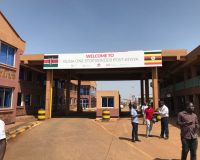The disbursement, announced by Social Protection and Senior Citizen Affairs Principal Secretary Joseph Motari, will cater for stipends covering June and July 2025, with each enrolled beneficiary set to receive Ksh.4,000 — Ksh.2,000 for each month. The payment, which began on Thursday, comes after a delay in the June cycle caused by a government data cleanup exercise aimed at improving accuracy and accountability in the program’s registry.
The Kenyan government has released more than Ksh.4.6 billion to over 1.15 million vulnerable citizens under the Inua Jamii cash transfer programme, clearing a month-long backlog and reaffirming its pledge to protect the country’s most at-risk groups.
The Ministry of Labour and Social Protection on Thursday began distributing Ksh.4,607,668,000 to beneficiaries of the Inua Jamii cash transfer programme, ending weeks of uncertainty for thousands of elderly citizens, orphans, vulnerable children, and persons living with severe disabilities.
In a statement issued by the State Department for Social Protection and Senior Citizen Affairs, Principal Secretary Joseph Motari confirmed that the funds will serve 1,151,917 Kenyans across the country. He said each beneficiary will receive Ksh.4,000 — covering both the June and July payment cycles — and assured recipients that the delay was necessary to strengthen the programme’s integrity.
“The June cycle payment had been delayed due to a data cleanup exercise,” said Motari. “The State Department apologises to beneficiaries for any inconvenience caused by the delay.”
The Inua Jamii programme is one of the government’s flagship social protection initiatives, launched to cushion vulnerable citizens from extreme poverty and provide a basic level of financial security. It targets three key groups: older persons aged 70 years and above, orphans and vulnerable children, and persons living with severe disabilities. The stipend, while modest, is often a lifeline for many households in rural and low-income urban areas.
Thursday’s disbursement marks a significant relief for beneficiaries, many of whom rely almost entirely on the monthly cash to meet basic needs such as food, rent, and medical expenses. The delay in June payments had sparked growing anxiety, with some recipients reporting difficulty affording daily essentials.
Motari explained that the government opted to delay the payout to allow for a thorough registry audit, aimed at identifying and removing duplicate or ineligible entries. According to ministry officials, the cleanup was prompted by concerns over possible irregularities in the programme’s database, which if left unchecked, could have resulted in funds being misdirected.
“Accuracy in our beneficiary records is not just about accountability for public funds; it’s also about ensuring that every shilling goes to the right person,” Motari said.
The government is also using the payment rollout to encourage all beneficiaries to register with the newly established Social Health Authority (SHA). The SHA is a key pillar in Kenya’s push toward Universal Health Coverage (UHC), designed to give vulnerable citizens access to affordable, quality healthcare.
“The government’s goal is not only to put cash in the hands of our senior citizens and other vulnerable groups but also to guarantee them access to healthcare without the burden of financial strain,” Motari noted.
Beneficiaries and their caregivers can access the funds through the eCitizen platform or by dialling *222# on their mobile phones, before withdrawing cash from authorised mobile money agents. The ministry has urged recipients to report any difficulties or suspected fraud to the nearest social protection office for prompt assistance.
In recent months, the State Department has moved to modernise and simplify the withdrawal process. Previously, many recipients faced challenges when payments were deposited into bank accounts, especially in rural areas with limited access to banking services. By partnering with mobile money platforms, the government says it has made the stipend more accessible and reduced the time beneficiaries spend travelling to collection points.
The Inua Jamii cash transfer programme has been credited with improving food security and reducing extreme poverty among target groups, though critics argue that the Ksh.2,000 monthly stipend per beneficiary remains insufficient in light of the rising cost of living. For many elderly Kenyans, however, the payments are a crucial supplement to meagre incomes, allowing them to purchase medicine, pay school fees for dependents, or meet other essential expenses.
Field reports from various counties on Thursday showed long queues at mobile money agents and community centres as word of the disbursement spread. In parts of Nyeri, Machakos, and Kakamega, beneficiaries expressed relief that the long wait was over, though some called for the government to consider increasing the monthly amount to keep up with inflation.
Speaking in Kiambu County, a group of elderly beneficiaries welcomed the payment but urged the Ministry to avoid future delays. “This money is what we use to survive. When it delays, we go hungry,” said 74-year-old Peter Njoroge. “We thank the government for remembering us, but they must remember us on time.”
The government maintains that improving efficiency in social protection programmes is a top priority. Officials say they are exploring ways to integrate biometric verification systems to further reduce cases of duplication or fraudulent claims, while ensuring that the most vulnerable are reached without unnecessary bureaucratic hurdles.
Thursday’s announcement also serves as a political statement on the government’s broader commitment to social welfare. President William Ruto has repeatedly cited the need to strengthen safety nets for disadvantaged Kenyans, arguing that economic growth must go hand-in-hand with measures that directly uplift those at the bottom of the socio-economic ladder.
Inua Jamii has grown steadily since its inception, now covering all 47 counties and reaching beneficiaries in both rural and urban settings. According to the Ministry of Labour and Social Protection, the programme has disbursed tens of billions of shillings since launch, making it one of the most significant direct cash transfer schemes in East Africa.
For the latest payment cycle, the Ministry says it will continue monitoring the rollout closely to ensure timely completion and to resolve any logistical issues. Beneficiaries are also being encouraged to maintain up-to-date personal information with local administrators to avoid future payment disruptions.
As the payments continue over the coming days, the Ministry is keen to reassure the public that the delay experienced in June will not become the norm. “We are committed to ensuring predictability in these payments,” Motari emphasised. “Beneficiaries should be able to count on this support without uncertainty.”
While the Ksh.4,000 payment for June and July will offer some relief, the broader challenge of sustaining and expanding such programmes amid tight fiscal constraints remains. Economists warn that as Kenya faces competing budgetary demands, maintaining funding for social protection will require both political will and innovative financing mechanisms.
For now, however, the focus is on delivering the long-awaited stipends to the elderly, orphans, vulnerable children, and persons with severe disabilities who depend on them. Across the country, from crowded urban settlements to remote villages, the arrival of the funds has sparked a mixture of gratitude, relief, and cautious optimism that the system can be made to work better — and on time.






